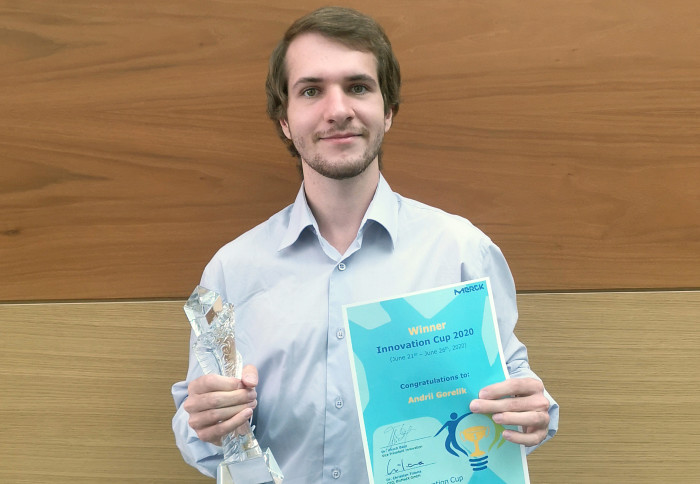New way to tackle disease-causing proteins wins €20k in innovation competition

Dr Andrii Gorelik with the Merck Innovation Cup
A team of international students and postdocs, including an Imperial researcher, have won the Merck Innovation Cup for their new drug innovation.
Dr Andrii Gorelik, from the Department of Chemistry at Imperial College London and the Francis Crick Institute, was part of a six-person team that won this year’s Merck Innovation Cup, a competition run by the pharmaceutical company to nurture new business ideas for unmet medical needs.
I am a fan of creative thinking and the Innovation Cup allowed our team to do exactly that: think outside the box and develop a feasible proposal that nobody has implemented before. Dr Andrii Gorelik
Ten teams of six competed from a pool of more than 2,000 applicants, developing one of their team’s proposals into a full business plan over the course of a week. Dr Gorelik proposed an idea for a new class of protein-degrading drugs, which was taken forward and further developed by him and his teammates from Stanford University (US), University of Cambridge (UK), University of California Berkley (US), Aarhus University (Denmark) and École Polytechnique Fédérale de Lausanne (Switzerland).
The team, ‘Drug Discovery Technologies’, won €20,000 and the chance for their innovation to be taken up by Merck.
Dr Gorelik, a postdoc in the Tate Group, said: “It’s been such a privilege to be part of this fantastic team effort, working with some of the smartest and most humble people I've ever met. I am a fan of creative thinking and the Innovation Cup allowed our team to do exactly that: think outside the box and develop a feasible proposal that nobody has implemented before. The week was very intense. We worked from early morning to midnight but in the end all the hard work paid off.”
A new way to find new drugs
Team Drug Discovery Technologies’ innovation involves new kinds of drugs known as protein degraders. Proteins are involved in all biological processes, including a wide range of diseases, from cancer to immune system and brain disorders. These are often tackled with drugs called protein inhibitors, which block their action in the body.

Protein degraders instead send disease-causing proteins to the waste disposal – they ‘tag’ the proteins so that they are carried to a cell’s natural protein-degrading machinery. Protein degraders have many potential advantages, such as targeting different kinds of proteins and requiring lower concentrations of drug, potentially lowering the risk of side effects.
The team proposed a new way to induce protein degradation, which they believe could be more universal and effective than existing protein degraders such as PROTACs (PROteolysis TArgeting Chimeras) and could target proteins existing drugs can’t.
The team created a new screening platform to identify new compounds that may have the right properties to work as their type of protein degrader, speeding up the process of drug discovery.
Dr Gorelik said: “I am looking forward to continuing our collaboration with Merck, to put our proposal into action and hopefully produce new protein degraders that could be used in the clinic.”
The next application round for the 2021 cup will start 1 November 2020 this year and applications can be submitted on the Merck Innovation Cup website.
Article text (excluding photos or graphics) © Imperial College London.
Photos and graphics subject to third party copyright used with permission or © Imperial College London.
Reporter
Hayley Dunning
Communications Division